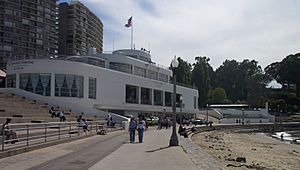Aquatic Park Cove facts for kids
Quick facts for kids Aquatic Park Historic District |
|
|---|---|

San Francisco Maritime Museum
|
|
| Location | San Francisco, California |
| Architect | Works Progress Administration |
| Architectural style(s) | Moderne |
| Governing body | National Park Service |
| Designated | January 26, 1984 |
| Reference no. | 84001183 |
| Designated | May 28, 1987 |
| Official name: Entrance of the San Carlos into San Francisco Bay | |
| Designated | 1936 |
| Reference no. | 236 |
| Lua error in Module:Location_map at line 420: attempt to index field 'wikibase' (a nil value). | |
The Aquatic Park Historic District is a special place on the San Francisco Bay waterfront. It's part of the San Francisco Maritime National Historical Park. This district includes a beach, a historic bathhouse, a pier, and other cool spots. It's known as a National Historic Landmark, meaning it's very important to American history.
A Special Place on the Bay
The main building here is the San Francisco Maritime Museum. It was built in 1936 as a bathhouse. The Works Progress Administration (WPA) helped build it. This building has a cool, modern design called "streamline moderne."
Inside, you'll find amazing, colorful murals. The Steamship Room shows how ships changed from wind power to steam power. You can also see displays of old tools and photos of San Francisco's early waterfront.
Fun at the Lagoon and Pier
In front of the Maritime Museum is a man-made lagoon. This lagoon was built where Black Point Cove used to be. To the west, there's a horseshoe-shaped pier called the Municipal Pier. It's a great spot for fishing!
The lagoon has a sandy beach and a concrete wall. South of the lagoon is a grassy area called Victorian Park. This park is where the Hyde Street cable car turns around. The Hyde Street Pier is nearby, but it's not part of the Aquatic Park Historic District.
A Look Back in Time
The Aquatic Park Historic District became a National Historic Landmark in 1987. It was also added to the National Register of Historic Places in 1984. This means it's officially recognized as a historic treasure.
The park is easy to find, right at the end of Polk Street. It's also known for having one of the cleanest beaches in California!
Near the park, you'll find a special marker. It honors the Spanish ship San Carlos. This ship was the first to enter San Francisco Bay on August 5, 1775.
The area was once called Black Point Cove. It was named after Black Point, a piece of land that sticks out into the bay. Black Point is the last part of San Francisco's original coastline east of the Golden Gate Bridge.
Gallery
-
From left to right: San Francisco Maritime National Historical Park, Telegraph Hill and Coit Tower, Fisherman's Wharf, Downtown San Francisco, Russian Hill and Aquatic Park Historic District.
 | Frances Mary Albrier |
 | Whitney Young |
 | Muhammad Ali |





